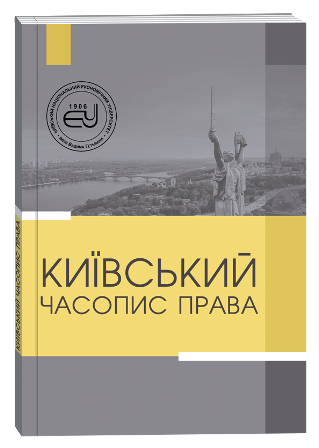SOME CONCEPTUAL PROBLEMS OF FORMING LEGAL REGIMES FOR THE USE AND PROTECTION OF WATER RESOURCES IN TERMS OF ECOSYSTEM DIVERSITY
DOI:
https://doi.org/10.32782/klj/2025.2.24Keywords:
water resources, water, water bodies, nature management, use of natural resources, environmental protection, sustainable development, water legislation, water fund landsAbstract
The article is devoted to determining the current peculiarities of regulatory and legal formation of legal regimes for the use and protection of water resources in terms of ecosystem diversity. The author proposes the author’s own approach to differentiating legal regimes of natural resources into three levels, whereby the first level is conventionally called “environmental and legal” (natural resource, integrative) in the narrow sense, since it defines the fundamental environmental and legal principles of regulation of relations in the field of use and protection of natural resources. The author establishes that the second level of legal regulation is characterized by special regulation of relations in the area of use and protection of natural resources by provisions of special legislation, in particular, the Land Code of Ukraine, the Forest Code of Ukraine, the Subsoil Code of Ukraine, etc. In turn, the third level of legal regulation is characterized by “integrated” regulation of relations on the use and protection of water resources as an element of natural ecosystems. This level of regulation of water resources is associated with their integrated legal significance in relation to other natural resources, which is reflected in the relevant provisions of special legislation. This leads to the conclusion that at the level of “object” legal regimes, legal regulation of water resources use faces certain peculiarities, which include, in particular, a largely “land-centered” approach to the regulation of relations on the use of water bodies and the priority of the legal regime of forests over other natural resources, which in a certain way endows the legal regime of use and protection of water bodies with an integrated and accentuated meaning, i.e., on the one hand, makes it an element of the legal regime of land. And only the legal regime of groundwater, due to the loyal attitude to it from the subsoil legislation, gives it a certain autonomy.
References
Мінка Т. П. Правовий режим як критерій поділу права на галузі. Часопис Київського університету права. 2010. № 3. С. 18–22.
Коссе Д. Д. Правовий режим та механізм правового регулювання: ознаки та співвідношення. Держава і право. Київ, 2009. Вип. 44. С. 25–31.
Петлюк Ю. С. Співвідношення понять «правове регулювання земельних правовідносин» і «правовий режим земель»: порівняльно-правовий аспект. Часопис Київського університету права. 2010. № 2. С. 248–251.
Мінка Т. П. Особливості класифікації адміністративно-правових режимів. Форум права: електрон. наук. фахове вид. 2012. № 3. С. 453–458. URL: http://nbuv.gov.ua/UJRN/FP_index.htm_2012_3_80 (дата звернення: 12.06.2025).
Гайдамака І. О. Правовий режим: поняття та види. Державне будівництво та місцеве самоврядування. 2008. Вип. 15. С. 120–127.
Смелянець Г. Є. Методи та режими правового регулювання. Актуальні проблеми держави і права. Одеса, 2004. Вип. 22. С. 89–94.
Бєлєвцева В. В. Теоретико-правова характеристика охоронних адміністративно-правових режимів в Україні. Митна справа. 2013. № 2 (86). Ч. 2, кн. 1. С. 163–169.
Водний кодекс України: Закон України від 06.06.1995 р. № 213/95-ВР. Відомості Верховної Ради України. 1995. № 24. Ст. 189 (із змінами).
Земельний кодекс України: Закон України від 25.10.2001 р. № 2768-ІІІ. Відомості. Верховної Ради України. 2002. № 3–4. Ст. 27 (зі змінами).
Гетьман А. П. Доктрина екологічного права та законодавства України: монографія. Харків: ТОВ «Оберіг», 2019. 336 с.
Гетьман А. Доктрина науки екологічного права: ґенеза теоретичних досліджень еколого-правових проблем у ХХ ст. Право України. 2014. № 12. С. 143–154.
Кодекс України про надра: Закон України від 27.07.1994 р. № 132/94-ВР. Відомості Верховної Ради України. 1994. № 36. Ст. 546 (із змінами).
Developing ambitious local long-term climate neutrality strategies: charting the course: crafting forward-thinking local climate neutrality strategies. Berlin–Krakow: Association of Municipalities Polish Network “Energie Cités” and Ecologic Institute, 2024. 175 p. URL: https://www.ecologic.eu/sites/default/files/publication/2024/30019-local-long-term-climate-neutrality-strategies.pdf (access date: 15.06.2025).
Oliver C. Sustainable Forestry. What is it? Do we achieve it? Journal of Forestry. 2003. P. 8–14.
Лісовий кодекс України: Закон України від 21.01.1994 р. № 3852-ХІІ. Відомості Верховної Ради України. 1994. № 17. Ст. 99 (із змінами).








